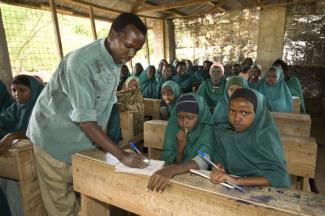Human security
“Do not close the camps”

According to Karanja Kibicho, Kenya’s principal secretary for interior affairs, the camps have a negative impact on security in the country. He argues that the Somali terror organisation Al Shabaab and related outfits get support from people in the camps. Moreover, the government speaks of economic constraints. Kenya has suffered terror attacks in recent years, and the government is struggling to get a grip on Al Shabaab (see D+C/E+Z e-Paper 2015/09, p. 28 ff.).
Kenya is currently hosting about 600,000 refugees in Dadaab and Kakuma. Dadaab is believed to be the world’s largest refugee camp. It was first established in 1992. The government wants to see it closed by the end of May next year. A deadline for Kakuma (see D+C/E+Z e-Paper 2016/02, p. 23 ff. and D+C/E+Z e-Paper 2016/03, p. 36 f.) has not been set so far.
The people in the camps are devastated. Deng Malual is from South Sudan and only arrived in Kakuma with his family of eight a few weeks ago. “We are in a safe place here,” he says, adding that violence and need haunt his home country. “My children were almost starving; there was no food, nothing.” He does not know where to take his family if they cannot stay in the camp.
The vast majority of the refugees feel similar despair, and they are offended by the implication that they support terrorism. According to Anne Cham, who is originally from Ethiopia and now lives in Dadaab, “refugees are not terrorists.” She says: “It is peaceful here – no violence, no killing, no forced landgrabs and no harassment.” She left her country due to conflict and emphasises: “We don’t kill people.” She appreciates that her child can go to school in Dadaab and that there is free food. She says that Kenya’s government should look for terrorists in other places. Her message to the government is: “Do not close the camps.”
Some camp residents say that the Kenyan government has the right to dismantle the camps, but most of the refugees simply do not know where to go. They fear they will be killed if they try to return home, and getting there would be very difficult anyway. Moreover, the refugees do not have access to other countries.
Some camp residents say they feel forgotten by the UN Refugee Agency (UNHCR). However, the UNHCR has indeed issued a statement in which it appeals to Kenya’s government to reconsider its decision. The UNHCR points out that “Kenya has played an extraordinary role over many years as one of the world’s frontline major refugee hosting nations, and that inevitably this has had many consequences for the country and its population.” Accordingly, Kenya should get more international support for its efforts, but should not close the camps. In view of some 60 million people around the world who have been forcibly displaced, the UNHCR argues, “it is more important than ever that international asylum obligations prevail and are properly supported.”
Non-governmental aid agencies support this stance. In a joint declaration, 11 organisations, including World Vision, Oxfam and the Refugee Consortium of Kenya, warn of a “humanitarian catastrophe in the region” should the two camps be shut down abruptly. They state that refugee laws and asylum regimes are under attack, especially in Europe, and that Kenya should not “follow that path”. Like the UNHCR, the NGOs want the international community to do more on behalf of refugees in general and in support of refugees in Kenya in particular.
Statements like these make sense to the people in Dadaab and Kakuma, but many of them are not informed. Unfortunately, moreover, one may have doubts whether the international community or the Kenyan government will actually heed the advice, though more international support would probably make a difference to the Kenyan government.
Peter Okello is the son of a South Sudanese refugee and grew up in Kakuma camp. He works as a journalist in Kenya.
okello17art@gmail.com
Links
Statement issued by 11 non-governmental organisations:
http://www.rescue.org/press-releases/media-advisory-government-kenya-reconsider-intended-closure-refugee-camps-30899
Statement issued by the UN Refugee Agency (UNHCR):
http://www.unhcr.org/57308e616.html







